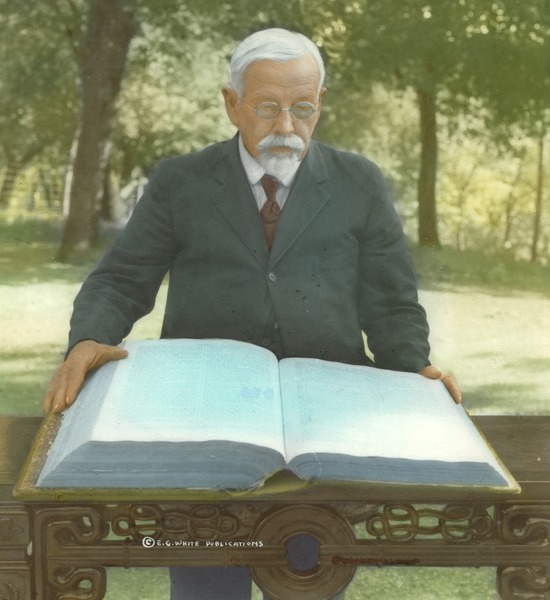Was Ellen G. White Really a Prophet?
If you look at what Scripture provides as tests for a true prophet, Ellen White meets all the criteria.
Additionally, the Seventh-day Adventist Church owes much of its history and development to remarkable things God accomplished through her willingness to be led by the Holy Spirit. She consistently demonstrated what the Bible describes as the prophetic gift, or the spiritual gift of prophecy (1 Corinthians 14; Romans 12:4-8).
So let’s look more closely at these Bible verses, and compare them directly with the life and ministry of Ellen White.
We’ll cover:
- What the Bible says about prophets
- Misconceptions about prophets
- Whether Ellen White fulfilled the biblical tests of a prophet
- Additional responsibilities of prophets
- Did Ellen White consider herself a prophet?
Let’s begin with some basic definitions from Scripture.
What does the Bible say about prophets?

Courtesy of the Ellen G. White Estate, Inc.
The Bible defines a prophet as someone who shares God’s message, usually to a specific audience (Deuteronomy 18:18; Jeremiah 1:9-17). Sometimes these messages were for the citizens of Israel, which happened often when prophets served as judges. And quite often, the messages spoken by prophets were directed toward those in power (2 Kings 22:15-20).
Regardless of the intended audience, however, a prophet often served as a source of spiritual insight for the people. God would work through this person to help people apply His Word to everyday life.
Prophets also would serve as a spiritual guard of sorts, reminding people what the Bible actually says and cautioning them not to twist biblical principles to serve personal purposes. Or, if it came to it, rebuking those who acted against what they knew was right.
For Ellen White, the above descriptions still fit. She was inspired to write numerous books to help people apply biblical principles to each area of their lives. She also helped revive important theological principles early Protestants had long forgotten—like keeping the seventh-day Sabbath and the nearness of Christ’s second coming.
God also gave Ellen White deeper insight into the challenges people experienced in her community. This enabled her to offer comfort, counsel, and correction where necessary.
And as strange as it may sound, much of this insight came from visions she received from the Holy Spirit.
If you look through the Bible, you find God communicating with prophets through visions very frequently (Numbers 12:6).
Some received straightforward messages to accomplish a particular mission, as Jonah did when he was told to go to Nineveh (Jonah 1:2).
Sometimes God gave visions that were symbolic. In the New Testament, Peter received a vision of a sheet filled with different animals to help him understand that people of all races and backgrounds should be considered equal when it comes to the body of Christ (Acts 10:10-35).
Other times, prophets were given vivid, vibrant dreams full of metaphors, symbolic images, and predictions of future events, like Isaiah, Ezekiel, and Daniel.
But all through post-biblical history and today, the idea of relaying messages from God or predicting the future is looked upon with skepticism.
(Maybe because it sounds too fantastic to be true! Or maybe because so many people have claimed to predict the future and have been wrong.)
But when it comes to the prophets in the Bible, everything they predicted has come to pass (except for events yet to happen).
And not only did prophets predict the future, many also performed extraordinary miracles. Moses proclaimed the 10 plagues God would bring upon the stubborn Egyptians. Elijah asked God to send fire from heaven (1 Kings 18: 36-38), and Elisha multiplied a widow’s supply of oil for cooking so they wouldn’t run out of food (2 Kings 4:1-7).
While miracles aren’t a biblical test for a prophet, Ellen White accomplished some amazing feats as well, through God’s power. One of the most remembered occurrences was while she was in vision, she held a large, heavy Bible as high as she could reach, in one hand, for hours without tiring.1
And she did this while pointing to and reciting Bible verses without even looking at the pages.2
But even when prophets started to gain attention for the miracles they performed, or the visions they had—they didn’t call attention to themselves. Unlike false prophets who can sometimes perform “miracles” with the help of evil angels, true prophets give God credit for everything (Genesis 41:15-16).
In short, true prophets are not looking to serve themselves. Instead, they’re looking to serve those around them—and in doing so, serving God.
In many cases, prophets were responsible for leading groups of people. They often lead them through difficult times or decisions, showing them that God will not abandon them even when things seem hopeless.
This is true of when Haggai encouraged the Israelites to build the temple even though it seemed hopeless (Haggai 2:1-9).
Ellen White was also responsible for leading fellow believers out of the Great Disappointment. She encouraged them to keep searching Scripture when many of them felt like giving up on God altogether.
But not everyone appreciated the Bible prophets. Elijah was hunted by his own king for years (1 Kings 19:1-3). Jeremiah was thrown into a dry well to starve (Jeremiah 38: 1-10).
While Ellen White didn’t receive any death threats that we know of, she did certainly have to deal with rumors, suspicion, and naysayers. Usually from fellow Christians.
But the real point here is that God’s prophets weren’t revered celebrities. Their objective and motivation is to be servants and messengers of God. And at times, that means even at the cost of safety, reputation, and welfare.
Many prophets were hated and persecuted by the very people they were trying to witness to.
So if Scripture has taught us anything, it’s that being a prophet doesn’t require popularity, and it certainly doesn’t cause it either.
In Ellen White’s case, she didn’t aspire to become a prophet. She was chosen—in much the same way as many prophets of the Bible. So she didn’t have any lofty goals of becoming a respected spiritual leader.
After her calling, as she realized the importance of the messages she was given to pass along, she prayed for God to humble her and keep her from pride. She attributed all her success to God’s leading in her life. And she didn’t refrain from telling the truth, even if the truth was unpalatable.
Like the Bible prophets before her, she faithfully obeyed what God asked her to do.
Misconceptions about prophets

Photo by Artem Maltsev on Unsplash
Now that we’ve addressed the Bible’s descriptions of prophets, let’s address some common misconceptions about them.
We recognize that the word “prophet” is often met with suspicion. Or it brings up mental pictures of strange, fantastical beings. So let’s clear the air by looking at some common misconceptions, and what the Bible says about those things.
Some common misconceptions about prophets are that:
- Only true prophets can perform miracles. Passages of Scripture show how false prophets will perform all kinds of tricks and illusions that appear as miracles (Exodus 7:11; Mark 13:22; 2 Thessalonians 2:9).
- Prophets should be worshiped. Prophets do not ask people to worship them. In fact, they would shut down any hint of worship toward them (1 Corinthians 1:12-17). They only ask people to worship God (Acts 14: 8-18). Likewise, Ellen White spoke out against those who would quote her words when it was Scripture that should be quoted.3
- Prophets are superhuman. Prophets are regular people. They make mistakes, get hurt, and at times struggle to follow God, just like the rest of us (Jonah 1: 1-2). Ellen White was a regular woman. She suffered from poor health most of her life. She also had to deal with significant frustration and discouragement, just like most of us, as well as heartwrenching grief as she lost two sons.
- Prophets are mystics. True prophets are never involved with spiritualism or mysticism. Mystics are false prophets (Deuteronomy 18:10-13). They’re not led by the Holy Spirit, but by demonic forces. In fact, Ellen White was in strong opposition to the mystic movements of her time.4
- Prophets can derive their power from multiple sources. If a prophet claims to derive their power from anything other than God—another deity, a crystal ball, or their own abilities—you can know for sure that they’re a false prophet. Ellen White only claimed her gifts came from God.
- Prophets are rich and prosperous—and want to make others rich and prosperous, too. Most of the prophets in the Bible led modest lives. Many were even homeless. But God took care of them.
Ellen White and her husband suffered many instances of financial hardship, sometimes even going without food.5 And if a self-proclaimed prophet brings attention to their wealth or prosperity, that’s a red flag right there.
In Acts 8 we can read about Simon, a sorcerer who thought he could buy the power of the Holy Spirit. He wanted to do what the apostles were doing so he wouldn’t lose his following. And as you can guess, he was rebuked.
- The work of a prophet is shrouded in mystery and strange rituals. False prophets have been known to take part in strange and dangerous rituals, often to make their knowledge and abilities seem otherworldly and unattainable (1 Kings 18:28).
But the work of a true prophet involves prayer and humility (1 Kings 18:36-37). Even when God asks His prophets to do strange things, He does it for communicative purposes.
For example, God told Ezekiel to lay on his side for many days to symbolize the years Israel lived in sin. Ezekiel didn’t choose to do that for some sort of demonstration of strength or power (Ezekiel 4:1-7).
- Everything a prophet says is for everyone, everywhere, at every time. Prophets’ messages can certainly be an inspiration to everyone. But more often than not, God had His messengers speak to a specific group of people, or even just to one person. And the message often had to do with the current challenges facing them. Take Jonah for instance. His message was for the Ninevites. He wasn’t rebuking anyone else at that time, although other nations could learn from Jonah’s message to turn away from sin and worship God.
In the same manner, Ellen White’s writings are understood in the context of the time they were written. While there are important principles we can draw from some of her messages to specific people or groups, we acknowledge that not everything she said is directly applicable to our lives today.
- The use of prophets is an outdated concept. Prophets weren’t just a product of the Old Testament. There were also New Testament prophets like Anna and John the Baptist (Luke 2:36; Matthew 11:9-11). Plus, we’re told that the Holy Spirit gives prophecy as one of the spiritual gifts (Romans 12:6-7; 1 Corinthians 14) and that as the Second Coming draws nearer, God will call upon many people to prophesy in His name (Acts 2:17).
- Only an adult male can be a prophet. The Holy Spirit doesn’t discriminate when it comes to the prophetic gift. Many women in the Bible were considered great prophets, such as Deborah (Judges 4:4-5), Miriam (Exodus 15:20-21), and Anna (Luke 2:36). And Samuel was called to be a prophet before he was even 12 years old.
With these misconceptions out of the way, it’s a lot easier to see why God can, does, and will still use prophets up until the day Jesus returns at the Second Coming.
God has prioritized communication with humans since He created them. He’s talked to them through the Bible, but also through the words of the prophets—especially when they needed to be reminded of what the Bible actually says.
Prophets may not be as high-profile today as they seemed in the Bible, but that doesn’t mean God isn’t still using people in that role. There may be hundreds or thousands of prophets serving God around the world right now. Just because they’re not delivering messages to us doesn’t mean they’re not active!
Does Ellen White fulfill the tests of a prophet?
But if we’re ever unsure if we’re encountering a prophet or not, the Bible does provide guidance on discerning between a true prophet and a false prophet. In fact, we’re encouraged to test all prophets and prophecies (1 John 4:1). And a true prophet must meet ALL these standards.
So what exactly are these tests? And does Ellen White pass them?
You can find the complete list of tests of a true prophet here: “6 Ways to Tell if Someone is a True Prophet.” But let’s get a quick overview of the standards a prophet must meet.
- Their messages completely align with the Bible (Isaiah 8:20): Ellen White uses Bible verses throughout her writings to help people understand where they could find the ideas she was expressing. She also encouraged fellow believers to test her words against Scripture and study for themselves.6
- They have a character like Christ (Matthew 7:16-20): Prophets are by no means perfect or sinless—but their habits should generally reveal that their goal is to be like Jesus Christ. And if they ever falter, they should be humble enough to admit it.
The people that knew Ellen White frequently commented on her service to God. When she died, a newspaper column spoke on the compassionate and selfless life she lived.7
- If they make predictions, they should come true without error (Jeremiah 28:9): If a prophecy mentions a predicted outcome (rather than a conditional outcome, like in the case of Jonah and Nineveh), Scripture tells us to compare these predictions with how things have played out.
It’s important to remember two things, however. First, false prophets can make predictions that come true, too—this is why no one single test is sufficient to determine if someone is a true prophet (Deuteronomy 13:1-3). Second, a true prophet might make a prediction that doesn’t come true if the prophecy was conditional upon certain decisions, like Jonah’s prophecy to Nineveh.
Ellen White was given insight about future events, many of which appear in The Great Controversy. But one of her most notable predictions was about coming judgment on San Francisco and Oakland.8
Some of her predictions have yet to come to pass, however. But with her track record so far, along with what we’re told in the Bible, we have an idea of what kinds of future events are in store for the world.
Does Ellen White fulfill the duties of a prophet?
A prophet’s calling is to share God’s message in whatever manner He specifies. There are also tasks and responsibilities that usually accompany this calling. And just as the prophets of the Bible did these things, so did Ellen White.
These duties often include:
- Traveling to spread the word. Jonah traveled to Nineveh with a very specific message. The apostles traveled all over, inspiring the spread of the early Christian church. Paul continued on that mission, traveling and preaching to different groups of believers about the unique challenges each group was facing. And Ellen White traveled all over the world to share how the truths found in the Bible are only becoming more and more relevant—and urgent, as we get closer and closer to the Second Coming.
- Writing down God’s messages to share. Most of the books in the Bible on the prophets were written by the prophets themselves. And after John experienced visions about heaven, the end times, the judgment, and more, he was commanded by an angel to write down what is now known as the book of Revelation (Revelation 1:19). And at the end of Ellen White’s ministry, she had written over 100,000 pages of spiritual and practical counsel to Christians.9
- Carefully relating visions and dreams. Prophets all throughout the Bible were careful to describe the visions God gave them. Ellen White did the same, describing what she saw in as much detail as possible.
- Balancing spiritual responsibilities with caring for their families and/or doing their jobs.

Courtesy of the Ellen G. White Estate, Inc.
Part of Hosea’s duty as a prophet was caring for his family (Hosea 3:1), and during and after being a disciple of Jesus, Peter was still a fisherman (John 21:3). And Paul, while traveling and preaching, supported himself by being a tentmaker (Acts 18:3). In the same manner, Ellen White made sure she maintained her practical, daily responsibilities. She didn’t rely on her prophetic gift for financial profit or to relieve her from her responsibilities as a mother and homemaker.10
- Confronting or calling out people who were causing problems. Being a prophet sure isn’t an easy job. They’d be up against doubt, mockery, and even persecution. But one of the hardest things a prophet had to do was deliver reproof.
Ellen White had an especially difficult time with it. She hated delivering messages of correction. It’s naturally an uncomfortable process, and she didn’t like the idea of causing people to feel bad.11
Even Jesus struggled with sharing upsetting messages, such as when He talked about the destruction of Jerusalem’s temple (Luke 19:41-44).
Prophets generally don’t take pleasure in correcting or bringing judgment on people (with the exception of Jonah). But because they care about the people they’re serving for God, they have to be honest.
At first, Ellen White didn’t want to be that kind of messenger. And several Bible prophets felt similarly. So many of them told God to pick someone else to do His work (Exodus 4:10-17; Judges 6:15-16; Jeremiah 1:6).
But she knew she had a job to do. No matter how difficult it got, she was determined to follow God’s will for her life. And in turn, to direct others to the promise of His salvation and the peace that can bring.
Did Ellen White consider herself a prophet?
In actuality, Ellen White never called herself a prophet. Instead, she called herself a messenger.12
Ellen White said she did not claim the title of a prophet because most people who have the boldness to claim the role of a prophet are often false prophets, using their title to manipulate others and distort the truth.13 She also felt her role went beyond prophesying—she was also called to write, preach, and minister to those who were poor and disadvantaged.14
So she wasn’t saying she didn’t have the spirit of prophecy from the Holy Spirit. She just wasn’t keen on using it as a title.
So then why does the Adventist world church call her a prophet?
Well, at first, early Adventist pioneers like Joseph Bates were skeptical of Ellen White’s gifts.15 But once they got to know her and started studying her writings, they agreed she was being guided by the Holy Spirit.
God gave her visions that helped point the disappointed Millerite people back to Him. Her prophetic guidance helped them connect and study passages of Scripture that formed the beliefs Adventists hold today—such as the Sabbath, the Investigative Judgment, and the Second Coming.
And she followed God’s leading to write down the information she was given, which appeared in magazines like the Review and Herald and in her books. Some of her most popular works include the Desire of Ages, The Great Controversy, and Steps to Christ.
But when it comes down to it, we describe her as a prophet because she met the description and passed the Bible’s tests. And defining her accurately helps us understand the purpose and significance of the messages she shared.
When people asked John the Baptist if he was a prophet or not, he also didn’t claim the title (John 1:8, 21). But Jesus described him as a “messenger” (Matthew 11:9-11, ESV), and John even acknowledged the passage of Scripture that identified him as the “voice of one crying out in the wilderness, ‘Make straight the way of the Lord…’” (John 1:23, ESV).
So whatever the reasoning behind the claiming or not claiming of the “prophet” title, we can recognize that Ellen White was inspired and empowered by the Holy Spirit.
It’s a way of glorifying God as well, since we’re acknowledging the amazing things He did through her. He is the real power behind any prophet.
And praising God, acknowledging His blessings, sharing His Word, and following His leading is what the Seventh-day Adventist Church is all about.
Want to learn more about who Ellen White was and what she did? Read her bio or check out
- Douglass, E. Herbert, Messenger of the Lord, (1998), p. 146. [↵]
- Ibid. [↵]
- White, Ellen G., Selected Messages, Book 3, p. 33 [↵]
- Ibid, p. 160 [↵]
- Ibid, p. 74 [↵]
- “The Test Results Pt. 3”, https://www.ellengwhitetruth.com/her-ministry/the-test-results/the-test-results-pt-3 [↵]
- “The Test Results Pt.4”, https://www.ellengwhitetruth.com/her-ministry/the-test-results/the-test-results-pt-4 [↵]
- “The Test Results”, https://www.ellengwhitetruth.com/her-ministry/the-test-results [↵]
- Ibid, p. 108 [↵]
- White, Ellen G., I’d Like to Ask Sister White…”, p. 67 [↵]
- Douglass, E. Herbert, Messenger of the Lord, (1998), p. 157 [↵]
- https://whiteestate.org/about/issues1/unusual/out-context/i-do-not-claim-be-prophetess/ [↵]
- Ibid. [↵]
- Ibid. [↵]
- Fortin, Denis, “Ellen G. White and the Gift of Prophecy: The Test of a Prophet”, https://www.andrews.edu/~fortind/EGWTest.htm [↵]
Related Articles
Questions about Adventists? Ask here!
Find answers to your questions about Seventh-day Adventists
More Answers
The Health Benefits of Fresh Air You Should Know About
The Health Benefits of Fresh Air You Should Know About“When you can’t breathe, nothing else matters,” the American Lung Association tells us. And while that’s true, the kind of air you’re breathing will determine the health benefits you experience. Breathing fresh...
What Do Seventh-day Adventists Choose to Eat?
What Do Seventh-day Adventists Choose to Eat?Food blogs overwhelm the internet; food fads are all the rage; and copycat and healthy versions of food are the subject of many a get-together. Eating—and eating the best way—is a big deal. And everybody has a different...
10 Incredible Ways Sunlight Can Improve Your Health
10 Incredible Ways Sunlight Can Improve Your HealthAre you concerned about sunlight’s negative effects? You might be the one who lathers on the sunscreen and covers up when you go outside. Or maybe you avoid being outside as much as possible. You might be surprised,...
Why Is Water So Important?
Why Is Water So Important?We all know that water is a substance we can’t live without. It quenches our thirst and keeps us hydrated on the inside. And it’s necessary for hygiene and cleansing on the outside too. But did you know that the cleansing properties of water...
Ellen White’s Writings and the Adventist Health Message
Seventh-day Adventists are known for their emphasis on healthy living. And Ellen G. White was a significant influence in the development of this priority and practice among Adventists.
Health Clinics
Ellen White and Adventist Healthcare—Ahead of Their Time Medical care in the mid-1800s was primitive, to say the least. Basic concepts we take for granted—such as proper handwashing or recognizing the dangers of bloodletting—were nonexistent. And doctors often had...
What Did Ellen White Teach about Vegetarianism?
What Did Ellen White Teach about Vegetarianism?One thing you might have heard about Seventh-day Adventists is their emphasis on a vegetarian lifestyle. If you’re wondering why that is, it goes back to our church’s humble beginnings: As Adventists studied the Bible,...
How Ellen White’s Teachings Can Improve Your Health
How Ellen White’s Teachings Can Improve Your Health Healthcare in the nineteenth century was said to leave “more disease than it took away” with its use of bloodletting and “medicines” like mercury and arsenic.1 As people questioned these methods, new approaches...
Change Your Perspective on Life with These 5 Mindsets
5 Biblical Mindsets to Change Your Life for the Better Sometimes, life is just plain hard. There’s no way around it. So would thinking about things differently really change anything? Our perspective on life, and everything it throws at us, affects more than we’re...
Bible Promises for When You’re Worried or Fearful
Bible Promises for When You’re Worried or Fearful The Bible is full of beautiful promises that can comfort us in a variety of situations. They can give us hope when we are hopeless, make us feel grateful for God’s love, and comfort us when we’re grieving or suffering....
12 Practical Ways to Overcome Worry
12 Practical Ways to Overcome Worry DISCLAIMER: This content is for informational purposes only. It does not constitute any professional medical advice and is not intended as a substitute for professional mental health therapy. It’s easy to get stuck in a cycle of...
How the Bible Talks About Worry, Fear, and Anxiety
How the Bible Talks About Worry, Fear, and Anxiety Worry and fear are the ingredients of anxiety. It’s easy to see how the world isn’t perfect—and the anticipation of a bad event or experience (that may or may not even happen) can end up draining the peace and...
How to Calm Anxious Thoughts, Using the Bible
How to Calm Anxious Thoughts, Using the Bible You were expecting a phone call from your daughter half an hour ago, and she still hasn’t called. She’s also not answering your calls. You feel your heart thumping as your thoughts race: What if she’s been in a car...
What You Should Know About the Adventist Health Studies
What You Should Know About the Adventist Health StudiesYou may have heard that Seventh-day Adventists care about health. But what you may not know is that Adventists have been the subjects of long-term research into lifestyle and health. Since 1958, researchers from...
Benefits of Sunlight
Yes, There Are Health Benefits of SunlightDespite the bad reputation it’s gotten, sunlight is generally associated with positivity, as shown by songs like “You Are My Sunshine,” or phrases that refer to delightful people as having a “sunny disposition.” There’s a...
Why Your Body Needs Rest for Optimal Health
Why Your Body Needs Rest for Optimal HealthStruggling to think straight? Wondering why you can’t remember that important tidbit you heard earlier today? Feeling like your emotions are about to explode? These are just some of the symptoms that can reveal your need for...
The Seventh-day Adventist Diet: One of Our Key Longevity Secrets
The Seventh-day Adventist Diet: One of Our Key Longevity SecretsOats, avocados, lentils, tofu—probably not what you first think of in a standard American diet. But if you show up at the home of an Adventist, chances are you may be served one of these staples. Out of a...
Why You Need Fresh Air
Why You Need Fresh Air“When you can’t breathe, nothing else matters,” the American Lung Association tells us. We couldn’t agree more! Breathing in clean air is an essential part of caring for our bodies, which God has given us. Together with other health principles,...
Sabbath Meal
Everything You Need to Know About Sabbath MealsFor Seventh-day Adventists, sharing a Sabbath meal with friends and family is one of the most special and memorable parts of the Sabbath. That’s why we want to share with you all about Sabbath meals and why they’re such a...
Adventists and Healthy Living
Adventists and Healthy LivingWhat’s the Adventist “Health Message” All About? One thing Seventh-day Adventists are known for is their emphasis on living healthy lives. Since our bodies are living temples of the Holy Spirit (1 Corinthians 6:19, 20), we strive to stay...
Water’s Importance—Physical Benefits and Spiritual Applications
Water’s Importance—Physical Benefits and Spiritual Applications We all know that water is a substance we can’t live without. Not only does it quench our thirst and keep us hydrated from the inside, but it’s necessary for hygiene and cleansing on the outside as well....
How Important is a “Day of Rest?”
How Important is a “Day of Rest?” Why God Created a Day for Downtime by Martin Casper Do you ever experience the feeling of complete overload? Do you feel like the only way you can get ahead is by slamming it 24/7? I hear these types of comments more and more...
7 Reasons Why a Day of Rest is Important
7 Reasons Why a Day of Rest is ImportantWe live in a fast-paced world. It seems as if success is measured in how much you can do in a short amount of time. (Extra points for the service or product that is available 24/7). The idea that we will be more successful if we...
How do Adventists choose what to eat?
How do Adventists choose what to eat?Every day, parents go through the ritual of getting their kids to eat what is healthy and good while trying to steer them away from what can hinder the growth of their developing bodies. Nutritionists work with their clients to...
How Can I Have a Better Marriage?
Is it possible to have a happy marriage?
How do Adventists make movie and music choices?
How do Adventists make movie and music choices?Cinema has come a long way since the first clips of motion pictures came to light in 1878. As the decades rolled on, film and music producers have created rivers of movies and albums for the masses. Today, watching movies...
Why are many Adventists Vegetarian?
Why are many Adventists Vegetarian?The diet intended for man is outlined in Genesis 1:29, “And God said, ‘See, I have given you every herb that yields seed which is on the face of all the earth, and every tree whose fruit yields seed; to you it shall be for food.’”...
Didn’t find your answer? Ask us!
We understand your concern of having questions but not knowing who to ask—we’ve felt it ourselves. When you’re ready to learn more about Adventists, send us a question! We know a thing or two about Adventists.























